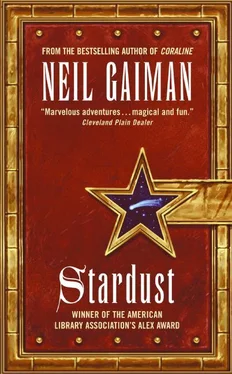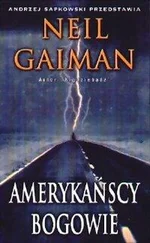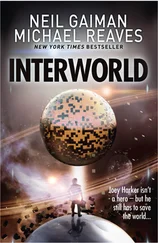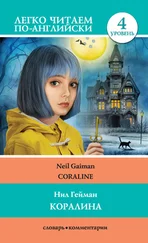They began to laugh, in high, bell-tinkling tones, pointing at Tristran, in his broken boots and blanket, and underclothes, and bowler hat. Tristran blushed red, and pulled the blanket about himself.
One of the little folk sang:
Hankety pankety
Boy in a blanket, he’s
Off on a goose-chase to
Look for a star
Incontrovertibly
Journeys through Faerie
Strip off the blanket to
See who you are.
And another one sang:
Tristran Thorn
Tristran Thorn
Does not know why he was born
And a foolish oath has sworn
Trews and coat and shirt are torn
So he sits here all forlorn
Soon to face his true love’s scorn
Wistran
Bistran
Tristran
Thorn.
“Be off with you, you silly things,” said Tristran, his face burning, and, having nothing else to hand, he threw his bowler hat at them.
Thus it was, that when the little hairy man arrived back from the village of Revelry (although why it was so called no man alive could say, for it was a gloomy, somber place, and had been for time out of mind) he found Tristran sitting glumly beside a hawthorn bush, wrapped in a blanket, and bewailing the loss of his hat.
“They said cruel things about my true love,” said Tristran. “Miss Victoria Forester. How dare they?”
“The little folk dare anything,” said his friend. “And they talks a lot of nonsense. But they talks an awful lot of sense, as well. You listen to ‘em at your peril, and you ignore ‘em at your peril, too.”
“They said I was soon to face my true love’s scorn.”
“Did they, indeed?” The little hairy man was laying a variety of clothes out upon the grass. Even in the moonlight, Tristran could see that the clothes he was laying out bore no manner of resemblance to the clothes that Tristran had removed earlier in the day.
In the village of Wall, men wore brown, and grey, and black; and even the reddest neckerchief worn by the ruddiest of farmers was soon faded by the sun and the rain to a more mannerly color. Tristran looked at the crimson and canary and russet cloth, at clothes which looked more like the costumes of traveling players or the contents of his cousin Joan’s charades chest, and said, “My clothes?”
“These are your clothes now,” said the little hairy man, proudly. “I traded ‘em. This stuffs better quality—see, it won’t rip and tear as easy—and it’s neither tattered nor torn, and withal, you’ll not stick out so much as a stranger. This is what people wears hereabouts, y’see.”
Tristran contemplated making the rest of his quest wrapped in a blanket, like a savage aboriginal from one of his schoolbooks. Then, with a sigh, he took off his boots, and let the blanket fall to the grass, and, with the little hairy man as his guide (“No, no, laddie, those go over that. Mercy, what do they teach them nowadays?”) he was soon dressed in his fine new clothes.
The new boots fit him better than the old ones ever had.
They certainly were fine new clothes. While clothes do not, as the saying would sometimes have it, make the man, and fine feathers do not make fine birds, sometimes they can add a certain spice to a recipe. And Tristran Thorn in crimson and canary was not the same man that Tristran Thorn in his overcoat and Sunday suit had been. There was a swagger to his steps, a jauntiness to his movements, that had not been there before. His chin went up instead of down, and there was a glint in his eye that he had not possessed when he had worn a bowler hat.
By the time they had eaten the meal the little hairy man had brought back with him from Revelry—which consisted of smoked trout, a bowl of fresh shelled peas, several small raisin-cakes, and a bottle of small beer—Tristran felt quite at home with his new garb.
“Now then,” said the little hairy man. “You’ve saved my life, laddie, back there in the serewood, and your father, he done me a good turn back before you was born, and let it never be said that I’m a cove what doesn’t pay his debts—”
Tristran began to mutter something about how his friend had already done more than enough for him, but the little hairy man ignored him and continued. “—so I was a-ponderin’: you know where your star is, don’t you?”
Tristran pointed, without hesitation, to the dark horizon.
“Now then, how far is it, to your star? D’you know that?”
Tristran had not given the matter any thought, hitherto, but he found himself saying, “A man could walk, only stopping to sleep, while the moon waxed and waned above him a half a dozen times, crossing treacherous mountains and burning deserts, before he reached the place where the star has fallen.”
It did not sound like the kind of thing that he would say at all, and he blinked with surprise.
“As I thought,” said the little hairy man, approaching his burden, and bending over it, so Tristran could not see how it unlocked. “And it’s not like you’re the only one’ll be lookin’ for it. You remember what I told you before?”
“About digging a hole to bury my dung in?”
“Not that.”
“About telling no one my true name, nor my destination?”
“Nor yet that.”
“Then what?”
“How many miles to Babylon ?” recited the man.
“Oh. Yes. That.”
“Can I get there by candlelight? There and back again. Only it’s the candle-wax, you see. Most candles won’t do it. This one took a lot of findin’.” And he pulled out a candle-stub the size of a crabapple, and handed it to Tristran.
Tristran could see nothing in any way out of the ordinary about the candle-stub. It was a wax candle, not tallow, and it was much used and melted. The wick was charred and black.
“What do I do with it?” he asked.
“All in good time,” said the little hairy man, and took something else from his pack. “Take this, too. You’ll need it.”
It glittered in the moonlight. Tristran took it; the little man’s gift seemed to be a thin silver chain, with a loop at each end. It was cold and slippery to the touch. “What is it?”
“The usual. Cat’s breath and fish-scales and moonlight on a mill-pond, melted and smithied and forged by the dwarfs. You’ll be needin’ it to bring your star back with you.”
“I will?”
“Oh, yes.”
Tristran let the chain fall into his palm: it felt like quicksilver. “Where do I keep it? I have no pockets in these confounded clothes.”
“Wrap it around your wrist until you need it. Like that. There you go. But you’ve a pocket in your tunic, under there, see?”
Tristran found the concealed pocket. Above it there was a small buttonhole, and in the buttonhole he placed the snowdrop, the glass flower that his father had given him as a luck token when he had left Wall. He wondered whether it was in fact bringing him luck, and if it were, was it good luck or bad?
Tristran stood up. He held his leather bag tightly in his hand.
“Now then,” said the little hairy man. “This is what you got to do. Take up the candle in your right hand; I’ll light it for you. And then, walk to your star. You’ll use the chain to bring it back here. There’s not much wick left on the candle, so you’d best be snappy about it, and step lively—any daw-dlin’ and you’ll regret it. Feet be nimble and light, yes?”
“I… I suppose so, yes,” said Tristran.
He stood expectantly. The little hairy man passed a hand over the candle, which lit with a flame yellow above and blue below. There was a gust of wind, but the flame did not flicker even the slightest bit.
Tristran took the candle in his hand, and he began to walk forward. The candlelight illuminated the world: every tree and bush and blade of grass.
Читать дальше








